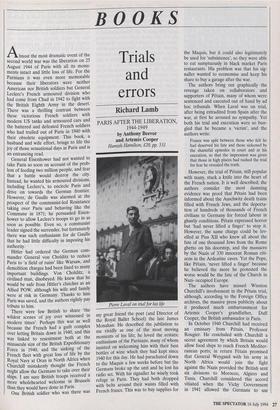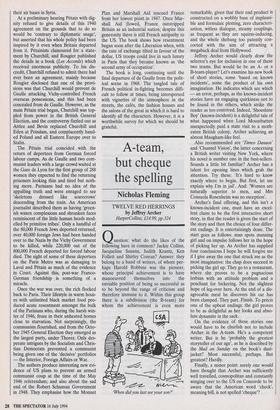BOOKS
Almost the most dramatic event of the second world war was the liberation on 25 August 1944 of Paris with all its monu- ments intact and little loss of life. For the Parisians it was even more memorable because their liberators were neither American nor British soldiers but General Leclerc's French armoured division who had come from Chad in 1942 to fight with the British Eighth Army in the desert. There was a thrilling contrast between these victorious French soldiers with modern US tanks and armoured cars and the battered and defeated French soldiers who had trailed out of Paris in 1940 with their obsolete equipment. This book, a husband and wife effort, brings to life the joy of those sensational days in Paris and is an entrancing read. General Eisenhower had not wanted to take Paris so soon on account of the prob- lem of feeding two million people, and fear that a battle would destroy the city. Instead, he wanted his armoured divisions, including Leclerc's, to encircle Paris and drive on towards the German frontier. However, de Gaulle was alarmed at the prospect of the communist-led Resistance taking over Paris and behaving like the Commune in 1871; he persuaded Eisen- hower to allow Leclerc's troops to go in as soon as possible. Even so, a communist leader signed the surrender, but fortunately there was such enthusiasm for de Gaulle that he had little difficulty in imposing his authority.
Hitler had ordered the German com- mander General von Cholditz to reduce Paris to 'a field of ruins' like Warsaw, and demolition charges had been fixed to many important buildings. Von Cholditz, a civilised man, disobeyed. He knew that he would be safe from Hitler's clutches as an Allied POW, although his wife and family were at risk in Germany. Thanks to him Paris was saved, and the authors rightly pay tribute to him.
There were few British to share 'the wildest scenes of joy ever witnessed in modern times'. Perhaps this was as well because the French had a guilt complex over letting Britain down in 1940, and this was linked to resentment both at the minuscule size of the British Expeditionary Force in 1940, and the sinking of the French fleet with great loss of life by the Royal Navy at Oran in North Africa when Churchill mistakenly thought the French might allow the Germans to take over their Ships. I am sure British troops received a more wholehearted welcome in Brussels than they would have done in Paris. One British soldier who was there was
Trials and errors
Richard Lamb
PARIS AFTER THE LIBERATION, 1944-1949 by Anthony Beevor and Artemis Cooper Hamish Hamilton, £20, pp. 531 my great friend the poet (and Director of the Royal Ballet School) the late James Monahan. He described the jubilation to me vividly as one of the most moving moments of his life; he loved the ecstatic enthusiasm of the Parisians, many of whom insisted on welcoming him with their best bottles of wine which they had kept since 1940 for this day. He had parachuted down to the Maquis a few weeks before but the Germans broke up the unit and he lost his radio set. With his signaller he wisely took refuge in Paris. They had both dropped with belts around their waists filled with French francs. This was to buy supplies for Pierre Laval on trial for his life the Maquis, but it could also legitimately be used for 'subsistence', so they were able to eat sumptuously in black market Paris restaurants. His problem was that his sig- naller wanted to economise and keep his share to buy a garage after the war.
The authors bring out graphically the revenge taken on collaborators and supporters of Petain, many of whom were sentenced and executed out of hand by ad hoc tribunals. When Laval was on trial, after being extradited from Spain after the war, at first he aroused no sympathy. Yet both his trial and execution were so bun- gled that he became a 'victim', and the authors write:
France was split between those who felt he had deserved his fate and those sickened by the shameful episodes in court and at his execution, so that the impression was given that those in high places had rushed the trial for fear he revealed the truth.
However, the trial of Petain, still popular with many, stuck a knife into the heart of the French nation. It is well described; the authors consider the most damning evidence was proof that Main had been informed about the Auschwitz death trains filled with French Jews, and the deporta- tion of hundreds of thousands of French civilians to Germany for forced labour in ghastly conditions. Main expressed horror but 'had never lifted a finger' to stop it. However, the same charge could be lev- elled at Pius XII who knew all about the fate of one thousand Jews from the Rome ghetto on his doorstep, and the massacre by the Nazis of 330 innocent Roman citi- zens in the Ardeatine caves. Yet the Pope, like Main, 'never lifted a finger' because he believed the more he protested the worse would be the fate of the Church in Nazi- occupied Europe.
The authors have missed Winston Churchill's involvement in the Main trial, although, according to the Foreign Office archives, the massive press publicity about it produced much embarrassment for Artemis Cooper's grandfather, Duff Cooper, the British ambassador in Paris.
In October 1940 Churchill had received an emissary from Petain, Professor Rougier. He concluded with Churchill a secret agreement by which Britain would allow food ships to reach French Mediter- ranean ports; in return Main promised that General Weygand with his army in North Africa would join the fight against the Nazis provided the British sent six divisions to Morocco, Algiers and Tunis. Churchill considered this accord vitiated when the Vichy Government in 1941 allowed the Germans to use their air bases in Syria.
At a preliminary hearing Main with dig- nity refused to give details of this 1940 agreement on the grounds that to do so would be 'contrary to diplomatic usage', but asserted that his whole policy had been inspired by it even when Britain departed from it. Petainists clamoured for a state- ment by Churchill, and Rougier published the details in a book (Les Accords) which received enormous publicity. To his dis- credit, Churchill refused to admit there had ever been an agreement, mainly because Rougier disclosed that one of the provi- sions was that Churchill would prevent de Gaulle attacking Vichy-controlled French overseas possessions, and this had been concealed from de Gaulle. However, as the main Main trial began, Churchill was top- pled from power in the British General Election, and the controversy fizzled out as Attlee and Bevin replaced Churchill and Eden at Potsdam, and complacently hand- ed Poland and all Eastern Europe over to Stalin.
The Main trial coincided with the return of deportees from German forced labour camps. As de Gaulle and two com- munist leaders with a large crowd waited at the Gare de Lyon for the first group of 288 women they expected to find the returning prisoners looking thin and tired but noth- ing more. Parisians had no idea of the appalling truth and were enraged to see 'skeletons dressed like scarecrows' descending from the train. An American journalist described them as having 'green- ish waxen complexions and shrunken faces reminiscent of the little human heads mod- elled by primitive tribes'. Only a handful of the 80,000 French Jews deported returned; over 40,000 foreign Jews had been handed over to the Nazis by the Vichy Government to be killed, while 220,000 out of the 800,000 French deported for forced labour died. The sight of some of these deportees on the Paris Metro was as damaging to Laval and Main as much of the evidence in Court. Against this, post-war Franco- 'German friendship is something of a miracle.
Once the war was over, the rich flocked back to Paris. Their lifestyle in warm hous- es with unlimited black market food pro- duced acute resentment amongst the bulk of the Parisians who, during the harsh win- ter of 1946, froze in their unheated homes close to starvation. Not surprisingly, the communists flourished, and from the Octo- ber 1945 General Election they emerged as the largest party, under Thorez. Only des- perate intrigues by the Socialists and Chris- tian Democrats prevented a communist being given one of the 'decisive' portfolios — the Interior, Foreign Affairs or War.
The authors produce interesting new evi- dence of US plans to prevent an armed communist coup at the time of the May 1946 referendum; and also about the sad end of the Robert Schuman Government in 1948. They emphasise how the Monnet Plan and Marshall Aid rescued France from her lowest point in 1947. Once Mar- shall Aid flowed, France outstripped Britain as an industrial nation; despite this generosity there is still French antipathy to the US. The book shows how resentment began soon after the Liberation when, with the rate of exchange tilted in favour of the dollar, US troops could live in such luxury in Paris that they became known as 'the second army of occupation'.
The book is long, continuing until the final departure of de Gaulle from the polit- ical scene in 1968. The tangled tale of French political in-fighting becomes diffi- cult to follow at times, being interspersed with vignettes of the atmosphere in the streets, the cafés, the fashion houses and the salons of the great in which it is hard to identify all the characters. However, it is a worthwhile survey for which we should be grateful.



















































 Previous page
Previous page